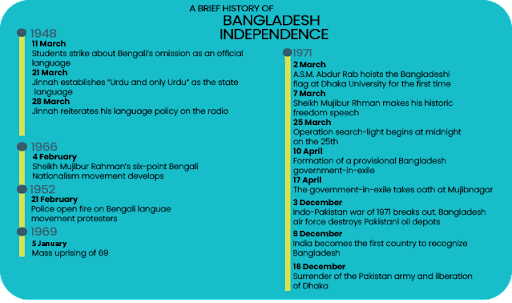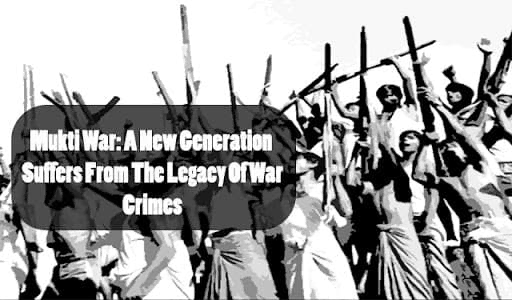Introduction
During the War of Liberation that turned East Pakistan into Bangladesh in 1971, the Mukti Bahini (literally “freedom warriors” or “liberation army”), also known as the Bangladesh Forces, was a guerrilla resistance movement made up of Bangladeshi military, paramilitary, and civilians. The Mukti war led to a lot of Bangladesh war crimes.
When did Mukti War all start back in 1947 with the great partition of India?
Mukti War all started back in 1947 with the great partition of India. In 1947, Pakistan’s military commanders united the forces. The commanders were trained at British Raj academies, and their unwavering conviction in the new state and its cultural foundation, Islam1, fueled their confidence. It is in stark contrast to the highly split army that Bangladesh’s separatist state gave birth to when it gained independence in 1971. Indeed, there were two critical differences between the Bangladeshi military and its equivalents in other South Asian countries.
Although Mukti Bahini was founded on 25 March 1971, amid the apex of the Bangladesh freedom movement, the crisis began with the anti-Ayub rebellion in 1969 and culminated in a political crisis during Sheikh Mujibur Rahman’s Six-point programme in the 1970s.
Awami League youth leaders Sheikh Fazlul Huq Moni, Tofael Ahmed, and Abdur Razzak headed the Mujib Bahini. William A. S. Ouderland, an Australian war veteran, organised guerrilla operations in Dacca and provided crucial intelligence to the Bangladeshi forces.

The reason behind Mukti war, East Pakistan and West Pakistan: a horrible mistake of Sir Cyril Radcliffe
The British Parliament approved the Indian Independence Act of 1947 on 15 July 1947. India was to be split into two countries: India and Pakistan. Pakistan was divided into West Pakistan and East Pakistan.
Former West Pakistan annexed the western section of Punjab, while the other half remained in India’s possession. In the same way, Bengal was partitioned into West Bengal and East Pakistan.
Sir Cyril Radcliffe had the enormous responsibility of separating the country into India and Pakistan. He needed to draw up the borders in June 1947. He planned to partition Punjab into two parts based on a contiguous population of Muslims and non-Muslims. Radcliffe took on the massive undertaking out of a sense of obligation.
A division of Punjab, which had a large Sikh population, was one of the most challenging jobs. While many Sikhs did not want to be a part of Muslim-dominated Pakistan, a small number demanded independence.
What are the Effects of the Mukti war?
War Crime, rape, and genocide 1971 in the Mukti War
The partition of India is one of the darkest periods in the country’s contemporary history.
- Almost a million people died, leaving over 12 million refugees in the place they previously called home.
- Murder, rape, and neighbours and friends turning on have all been reported.
- According to noted Bangladesh Supreme Court advocate and activist Farzana Mahmood, the brutal killings of 3,000,000 unarmed and innocent civilians by the Pakistani army and their local collaborators in Bangladesh during the 1971 liberation war to exterminate Bengalis as well as religious minorities, specifically Hindus, falls within the scope of crimes of genocide under the Genocide Convention of 1949.
Several issues kept those responsible for the heinous genocide in Bangladesh in 1971 from being brought to justice.
What is the reason behind mental disorders because of the Mukti War?
One of the most severe consequences of war is the influence on the mental health of civilians. A whole generation faced mental disorders because of the Mukti war.
- People in war zones can’t put into words the mental anguish they witness and suffer.
- Various terrible occurrences occurred during the Mukti conflict, directly impacting the people. As a result, a generation’s odds of acquiring mental health issues such as post-traumatic stress disorder (P.T.S.D.), anxiety, and depression, as well as inferior adult life outcomes, increased.
- Violent armed conflicts separated children from their families.
- People were exposed to or engaged in homicides and other terrible situations.
- They were at risk of rejection from family and community after the battle, psychological stress, and physical damage. Such events impact women more than men. These also significantly affect children, the elderly, and the disabled.
Researches link the degree of trauma and physical and emotional support availability to prevalence rates. Cultural and religious coping techniques can exacerbate the problem. The new generation is still suffering from war crimes, directly or indirectly.
What is The turnaround of Bangladesh’s economy due to the Mukti war
Because of the vast relief effort of the United Nations Relief Organisation in Bangladesh (U.N.R.O.B.) and other foreign organisations in the first two years following independence, war-torn Bangladesh avoided a catastrophic economic disaster and large-scale starvation.
The Bangladesh economy began to show increasing signs of trouble after U.N.R.O.B. operations ended on 31 December 1973. It was due to several factors. First, worldwide inflation, which started in 1972, had a considerable impact on Bangladesh’s economy.
Bangladesh adopted a socialist economy after independence. They began nationalising all industries, which proved to be a crucial miscalculation. India committed US$232 million in aid to Bangladesh between December 1971 and January 1972 using the politico-economic resource it got. Bangladeshi officials began to focus on establishing new industrial capacity and mending the country’s economy after 1975.
However, Bangladesh is recovering as poverty has dropped significantly in the last decade. Since 1992, more than 15 million individuals have been lifted out of poverty, making it a significant enhancement.
Conclusion
During the War of Liberation, the Mukti war was a guerrilla resistance movement made up of Bangladeshi military, paramilitary, and civilians that changed East Pakistan into Bangladesh in 1971. Mujib Bahini was created on 25 March 1971, at the height of Bangladesh’s independence struggle. Erstwhile, West Pakistan annexed the western part of Punjab. The training of Pakistan’s military commanders in British Raj academies and their steadfast belief in the new state and its cultural foundation, Islam1, brought its military forces together in 1947. The partition of India by Sir Radcliffe is one of the darkest episodes in the country’s recent history.
Almost a million people died, leaving more than 12 million refugees they once called home because of the Bangladesh war crime. The extermination of 3,000,000 civilians in Bangladesh by the Pakistani army and their local accomplices during the 1971 liberation war qualifies as genocide under the 1949 Genocide Convention. Bangladesh’s economy is on the mend.










